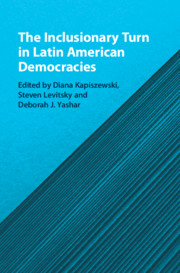Book contents
- The Inclusionary Turn in Latin American Democracies
- The Inclusionary Turn in Latin American Democracies
- Copyright page
- Contents
- Figures
- Tables
- Contributors
- Acknowledgments
- Prologue: Reflections on Two Episodes of Popular Inclusion
- 1 Inequality, Democracy, and the Inclusionary Turn in Latin America
- Part I Extending Social Policy and Participation
- Part II Inclusion and Partisan Representation
- Part III New Party–Society Linkages
- Part IV Inclusion, Populism, and Democracy
- References
Part III - New Party–Society Linkages
Published online by Cambridge University Press: 12 January 2021
- The Inclusionary Turn in Latin American Democracies
- The Inclusionary Turn in Latin American Democracies
- Copyright page
- Contents
- Figures
- Tables
- Contributors
- Acknowledgments
- Prologue: Reflections on Two Episodes of Popular Inclusion
- 1 Inequality, Democracy, and the Inclusionary Turn in Latin America
- Part I Extending Social Policy and Participation
- Part II Inclusion and Partisan Representation
- Part III New Party–Society Linkages
- Part IV Inclusion, Populism, and Democracy
- References
Summary

- Type
- Chapter
- Information
- The Inclusionary Turn in Latin American Democracies , pp. 285 - 398Publisher: Cambridge University PressPrint publication year: 2021
References
References
References
References
Author’s Interviews
Barrientos, Jaime. Valparaíso, Chile, Jan. 19, 2015.
Contreras, Leonardo. Valparaíso, Chile, Oct. 25, 2017.
Cooper, Alfred. Santiago, Chile, Jan. 20, 2015.
Durán Sepúlveda, Eduardo. Santiago, Chile, Oct. 27, 2017.
Gómez, Evelyn. Santiago, Chile, Oct. 25, 2017.
Larrondo, Abraham. Santiago, Chile, Jan. 15, 2015.
Muñoz, Francesca. Concepción, Chile, Jan. 14, 2015.
Muñoz, Héctor. Concepción, Chile, Jan. 14, 2015.
Pérez, Rosario. Valparaíso, Chile, Oct. 25, 2017.
Roldán, Eddy. Santiago, Chile, Oct. 23, 2017.
Soto, Emiliano. Santiago, Chile, Jan. 22, 2015.
Valenzuela, Samuel. Santiago, Jan. 19, 2015.
- 1
- Cited by



